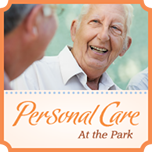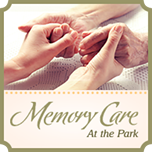Personal and memory care communities often have negative misconceptions about their care, management, and overall atmosphere. Some of these notions are so strong that they keep people from changing to a new way of life with many benefits.

To make the most of the time as you explore Personal and Memory Care living options, be aware of the false narratives written about them.
Myth #1: There goes my independence
Some people are concerned about giving up their independence after spending so much time in their own space and adhering to their own personal schedule. Though administered health and medical services are highlighted in this transition, personal and memory care communities work hard to ensure that their residents still have a sense of self and dignity. Gloria Dei’s Personal and Memory Care Communities offer many options to explore. Residents can take advantage of salons, barber shops, sharing a meal together, and visiting onsite banking, among other shops, at their leisure.
Myth #2: Safety is a concern
Feeling comfortable with the individuals surrounding you is prioritized in Gloria Dei’s Personal Care and Memory Care Communities. To ensure you’re in good hands, licensed nurses are onsite 24/7. All staff must complete and pass a background check, and the establishment is always up to date with legal regulations. Having a few extra sets of eyes for monitoring ensures someone will be present in the event of an emergency. Some safety measures put in place are video cameras, as well as locked doors that prohibit outside entry. Rooms are equipped with call bells located in the bedside areas and bathrooms. Safety bars are installed throughout the floor plan to reduce falls and other risks.
Myth #3: Healthcare services are limited
Health should always be a priority. No matter your health stage, Gloria Dei’s Personal and Memory Care Communities offer quality healthcare in various realms. In addition to being in the hands of licensed nurses and professionals, Memory Care Communities are staffed by Certified Dementia Care Practitioners. For everyday needs, physicians are readily available for visitation as needed. Mobile dental units are available and equipped to serve residents at their convenience. In more dire circumstances, residents have access to hospice care. Podiatry, optometry, and audiology services are included. Medication management is included to ensure all individuals follow a proper consumption schedule. Nurses assist in doing so by administering medication to residents as needed. Aside from physical needs, the communities also offer psychiatric assistance. Gloria Dei provides a supportive environment and always going the extra mile to ensure all residents are cared for.
Myth #4: Feeling lonely is inevitable
Another common misconception about Personal and Memory Care Communities is that they make you feel lonely and bored. With the number of amenities provided and opportunities for social interaction, residents will experience the opposite. Everyone can find something they enjoy with the various amenities available. Considering all interests, activities in your community can keep you occupied and promote socializing with others. Friends, family, and everyone in between are welcome for visitation. The invitation is always extended to stop by, have a meal, participate in activities, or take their loved ones out for the day. For those residing in the Memory Care Community, each resident is equipped with a memory box designed by their loved ones. The memory boxes are designed to welcome and signal each individual as they come and go.
Myth #5: The environment isn’t clean
The Personal and Memory Care Communities feature clutter-free spaces, both private and for communal use. The staff takes responsibility for keeping the community sanitary. Nurses must be trained and educated on illness control and other measures to take within that realm. All necessary precautions are taken to prevent potential sickness or infections from arising. Communities abide by policies to promote the health and well-being of residents. Housekeeping services make daily rounds to assist with general upkeep in each resident’s room. Common areas are treated to the same benefits as well.
Myth #6: The food is unappetizing
The idea that Personal and Memory Care Communities provide bland, non-nutritional meals is a thing of the past. With health being a top priority, healthy and appealing food is guaranteed. Chefs are always there for breakfast, lunch, and dinner daily. Rather than having premade, cafeteria-style food, residents can order off a menu that has options for all. Having authentic restaurants and cafes to sit in enhances the community living experience. On holidays, traditional dishes are prepared for residents to enjoy. Food allergies and other dietary restrictions are not a problem. Residents can access restaurant-style dining with a three-meal service, coffee shops, and convenience stores. When needed, they also can order room service that is delivered free of charge.
Myth #7: Family should take on the responsibility
Being able to stay in close quarters with your family sounds ideal. With that said, family members or friends may not be as suitable to support and provide the necessary care. Professional support systems can be more reliable than a loved one, especially in a dire situation. Even when it comes to minimal tasks such as administering medication, bathing, or dressing, having that controlled by someone who knows what they’re doing and will stay on top of it is of the utmost importance. Being cared for by a loved one can affect relationships. When stress and anxiety may be heightened, you never know the outcome.
Make your move
Receiving customized care tailored to your liking goes a long way. When health risks start to run more severe than others, it’s important to trust those caring for you and to feel positive about where you live. Rather than worrying about taking care of yourself or being reliant on someone not as considerate of your wellness, consider these ten benefits offered by senior living communities and transition to a place dedicated to you.
References
10 common myths about senior living. Tuscan Gardens Senior Living. (2019, September 16). Retrieved July 21, 2022, from https://tuscangardens.com/blog/10-common-myths-about-senior-living/
Angelladmin. (2020, December 28). 5 of the most common misconceptions about senior living. Luther Manor. Retrieved July 21, 2022, from https://www.luthermanor.org/5-of-the-most-common-misconceptions-about-senior-living
Assisted living vs. nursing homes: Key differences | wylm. (n.d.). Retrieved July 21, 2022, from https://www.whereyoulivematters.org/assisted-living-vs-nursing-home/
Grahame. (2022, June 22). Retirement community in Wauwatosa, WI. Luther Manor. Retrieved July 21, 2022, from https://www.luthermanor.org/
The Piper. (2020, November 24). Senior living myth #3: It’s too expensive. The Piper. Retrieved July 21, 2022, from https://www.thepiperlife.com/kansas-city-senior-living-myth-3-its-too-expensive
Top 5 assisted living myths. Top 5 Assisted Living Myths | A Place for Mom. (n.d.). Retrieved July 21, 2022, from https://www.aplaceformom.com/caregiver-resources/articles/assisted-living-myths
Uplands Village, & *, N. (2021, June 22). 5 common myths & misconceptions about senior living. Uplands Village. Retrieved July 21, 2022, from https://www.uplandsvillage.com/blog/misconceptions-senior-living/
What is assisted living? | where you live matters – asha. (n.d.). Retrieved July 21, 2022, from https://www.whereyoulivematters.org/assisted-living-defined/











